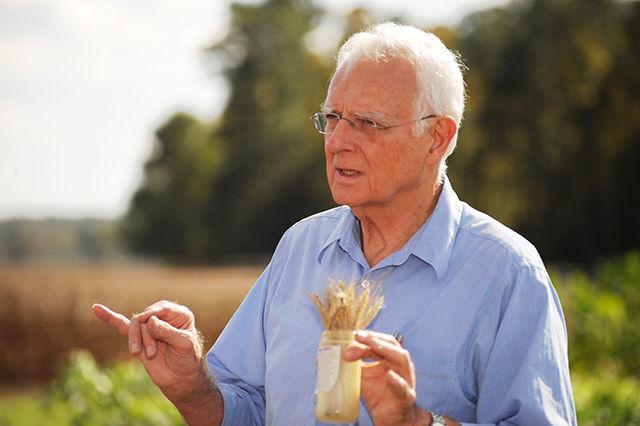On a field trip to the Inter-Faith Food Shuttle, Bob Patterson, alumni distinguished professor of crop science, splits his students into three groups. The first gets an excellent meal, the second gets a mediocre meal and the third group sits on the floor, eating a bad meal.
“It’s a powerful experience; I ask the students later in their career how they feel about it, and they no longer take food for granted,” Patterson said.
Through his interactive “STS 323: World Population and Food Prospects” course, Patterson encourages students to think on a global level. He is a recipient of the 2016 Green Brick Awards, which are given for outstanding contributions to sustainability.
“I grew up in a simple rural environment in the foothills of NC,” Patterson said. “My mother taught by her example not to be wasteful. I grew up on a farm practicing what I teach today.”
After pursuing graduate school at Cornell University, he returned to NC State to teach a crop science class. At the time, Chancellor John Caldwell wanted to bring into existence courses of student interest — one of which was STS 323. With the conception of the First Year College (now Exploratory Studies), Patterson introduced a freshman version of the course. Although working with freshmen is challenging, Patterson said it is highly rewarding.
“The best part about teaching is the opportunity to plant seeds in the minds of the freshmen,” Patterson said. “I have the opportunity to work with students before their minds are completely made up about life.”
A Fulbright Scholar, Patterson conducted research and taught at Humboldt University of Berlin. In 2009, Patterson returned to attend the “Long Night of Science,” in which science institutions, laboratories and libraries in Berlin and Potsdam are showcased.
“They open their doors and demonstrate how the university is spending the public’s money,” Patterson said. “Probably 75 percent of what I saw had to do with green Germany. It’s incredible what they’re doing with wind, solar, nuclear and hydroelectricity. I’ve learned so much that I can’t wait to share with my students.”
According to Patterson, Germany prioritizes minimizing adverse effects on the environment. Consequences of growing crops are researched as much the crops themselves.
“They don’t want any waste in growing the food,” Patterson said. “You can go down the street in Berlin and you’ll find a dozen organic food stores for every one that’s not organic.”
Locally, Patterson takes his students on numerous field trips; the Burlington Engineering Laboratories, SOUL Garden, J.C. Raulston Arboretum and the NCSU Solar House, to name a few.
“It helps our students understand the importance of being green,” Patterson said. “That’s the way I encourage my students to think.”
One destination is NC State’s Agroecology Education Farm, where students learn about the proper growing of plants and volunteer on their own for a few hours. Also being a Green Brick Award recipient, the farm functions as an educational apparatus. Notably, all the produce grown is provided to on-campus dining.
“Nothing synthetic is produced out here, be that chemicals or fertilizer,” said Alison Reeves, farm manager. “It’s a different way of growing — they’re all natural.”
The fruitful hub sits on six acres adjacent to a nature preserve. The farm has a strong sense of community, attracting apprentices and volunteers.
“We get a lot of students who may not come from farming backgrounds, which can be one of the first introductions to where their food comes from,” Reeves said. “We also get kids. I usually send them on a scavenger hunt for bugs. We try to be a place where students and the community can coexist.”
According to Chris Dunham of NC State Dining, the farm produces 27 percent of the food across campus. It also contributes to The State Club on Centennial Campus.
“A big part of my job is sourcing local items,” Dunham said. “For example, I saw that we weren’t buying sweet potatoes from NC. We had the flexibility to do that because we’re self-operated. We’re the last school in-state that does that.”
A contract has its benefits, as the corporation makes the decisions of what ingredients to use and where they’re coming from. Nevertheless, it could take anywhere from six weeks to six months to put a new item in the system, according to Dunham.
“We spend our money how we want,” Dunham said. “But we don’t make a profit; we break even every year, donating what we have leftover to scholarships for the university. Last year, we donated over $1 million in scholarships. We’re the lowest-priced meal plan in the state, potentially the lowest in the southeast.”
Dunham meets with the chefs every few weeks to inform them of what’s available and what they need. The chefs have their own row of crops, including lime, lemon and basil.
“Dining is welcoming to us,” Dunham said. “We’re a lot more culinary-driven than we were in the past; we have more chefs now.”
The Agroecology Farm exists within the chefs’ recipes, growing produce year-round. Unique crops such as yellow beets, purple broccoli and ground cherries set its produce apart.
For instance, the moon and stars watermelon is distinguished by its yellow flesh and speckled exterior. This celestial fruit is served on special occasions, such as the upcoming All Carolinas Meal Aug. 25. The meal is locally curated and presented buffet-style outside of Fountain Dining Hall. The event will feature vendors and a local band.
“The first All Carolinas Meal we ever did had canned green beans,” Dunham said. “It’s definitely not like that anymore. NC State Dining only uses fresh and frozen produce now.”
Looking forward, the Agroecology Farm wants to introduce compost for food waste and a post-harvesting area.
“NC State has a robust sustainability program that includes numerous initiatives going beyond green or environmental sustainability that create a better quality of life for our community, developing leaders that have knowledge of sustainability,” said Tracy Dixon, director of the University Sustainability Office.








